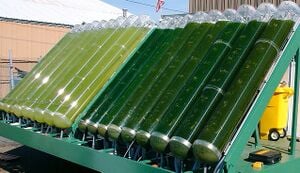The sustainability wiki
Community Action News
- Islington Climate Emergency Centre – a movement is growing, realmedia.press (Mar 29, 2022) — "The science is clear. It's not those fighting to put food on the table who need to fix this mess, right? It's the high consuming communities, high consuming individuals who need to act furthest and fastest." Tom Bailey, TakeTheJump.org
- A billion of the world's most climate-vulnerable people live in informal settlements – here's what they face, The Conversation (Mar 22, 2022)
- Costa Rica's Los Higuerones coop is a perfect example of what a CAN looks like - combining economy, relationship and conviviality, The Daily Alternative (Mar 21, 2022)
- 'Madness' to turn to fossil fuels because of Ukraine war, UN Secretary General, BBC News (Mar 21, 2022)
- Nature surpassing nation: the Amazon Sacred Headwaters shows how a bioregion can transcend borders, The Daily Alternative (Mar 14, 2022)
Selected page

Biofuel is a term used to describe fuel sources that are derived from easily regeneratable animal or plant-based resources. Biofuels are categorically different from fossil fuels, as biofuel production is not based on the anaerobic decomposition of buried organic matter. Furthermore, fossil fuel deposits take millions of year to form and are a naturally occurring phenomenon while resources for biofuel production are usually considered renewable and are typically representative of the bi-product from some other production process. Biofuels are thus a form of closed-loop recycling recycling, as the waste product from some production process is re-appropriated in to fuel for the process itself. It should be noted that although biofuels vary greatly in nature from fossil fuels, they are both a form of indirect solar energy; the initial energetic input stored in these fuels originated from the sun and was captured via terrestrial primary production processes, or photosynthesis.
Biofuels can be divided in to two categories of first-generation and second-generation:
- First generation describes biofuels that are derived from the edible parts of plants. A consideration associated with this form of biofuel is that large-scale production involves the mass cultivation of crops (such as maize) that could be otherwise be inputted into the global food system. Valuable resources such as arable land are thus prioritized for fuel production, rather than food production.
- Second generation describes biofuels that are derived from non-edible parts of plants, such as woody stems, branches, etc. or from fruits that are not a part of the human diet. A benefit associated with second generation biofuels is that, unlike first generation processes, production is not inversely related to global food system production. Second-generation biofuel can be further divided in 2+ generation-biofuels and 2++ generation-biofuels
- 2+ generation-biofuel production involves no use of arable land at all for energy production (i.e. algae fuel)
- 2++ generation-biofuel production involves no use of arable land at all for energy production and no air pollution (this still occurs with the other biofuels, although there are no carbon emissions). (i.e. biohydrogen)
Our users
Here are some of the organizations that have already uploaded content to Appropedia. Your organization can join too!
Help us grow!
Appropedia is created by people like you! Feel free to contribute to Appropedia your original research, projects, current works, observations and wisdom. Improve articles by clicking "edit" on top of any page or section. Our philosophy is: BE BOLD and contribute!
Questions? Comments? Visit the Village pump and drop a note.














